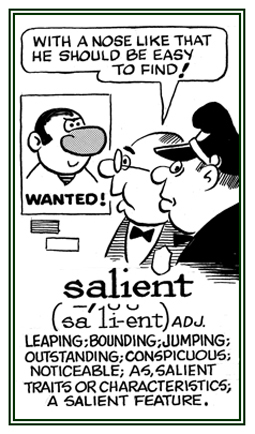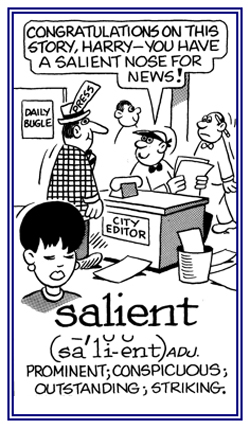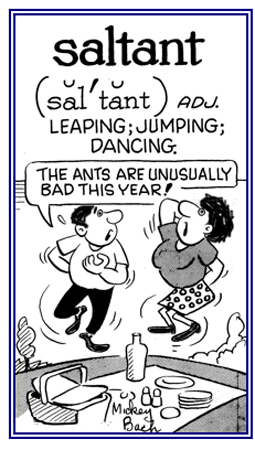sali-, salt-, -sili-, sult-, -salta-
(Latin: to leap, leaping; to jump, jumping; to hop, hopping; to spring forward, springing forward)
Don't confuse this sali-, salt-; "jump" unit with another sal-, sali- unit which refers to "salt".
There are times when people must decide whether a book is a work of literature or if it is merely a salacious publication.
2. Relating to a certain kind of moral looseness, obscene reports and lewd tales.The Los Angeles Unified School District board fired an elementary school teacher just hours after he was formally charged with three felony counts of salacious acts upon a girl under the age of 14, a school spokesman said.3. Etymology: from Latin salax, salacis, "lustful"; probably originally "fond of leaping" as in a male animal leaping on a female, from salire, "to leap".
2. Lewd or off-color used in reference to deliberately provocative pictures or writing: There is too much salaciousness being presented by people who feel that they can be as vulgar as much as they want to be, anytime, or anywhere.
2. Relative importance based on context: Paul, the reporter, covered all of the factual saliences of the criminal trial.
3. Being prominent or important: The salience of the politician, Mr. Jones, was expected to be an elective advantage.
Mary and the group working on the project presented a plan that had several obvious or salient flaws or wrong ideas.
Jim, the politician, tends to be very verbose, so the newspaper reporter is trying to take notes only on the most salient or worthwhile contents of his vociferous or loud exclamations.
2. Descriptive of that which extends out from a surface: The salient bump on the road was caused by the roots of the tree growing next to it.3. A reference to an angle that projects out from a polygon: In geometry, the salient angles were pointing outwardly less than 180°.
4. Characteristic of something that is projecting or jutting beyond a line or surface; protruding in an outward direction: The tourists, Becky and Brenda, stood on the salient cliff overlooking the ocean so they could see the whales below.
5. In heraldry, represented as a leaping animal: The shield presented a salient image of a lion as if it were jumping into the air.
6. Pertaining to a part of a military front line, or fortification, that projects outward into enemy-held territory or toward the enemy: The military placed a unit of soldiers on the nearest salient point so they would have an advantage in defending themselves.
7. Etymology: "leaping" a heraldic term, from Latin salientem, saliens a form of salire, "to leap."


Go to this Word A Day Revisited Index
so you can see more of Mickey Bach's cartoons.
2. A sudden quick witticism or quick and clever remarks: Sam has a sense of humor and his jokes and sallies entertained everyone at the party.
2. To set out or to depart on an excursion or a venture: Dustin and Beatrice sallied forth from their camp to explore the forests around the mountain.
3. A bounding out or a rush to leave: After the bell rang ending the last class of the day, the students sallied out of the classrooms.
2. Etymology: from Old French salmun, from Latin salmonem (nominative case, salmo), "a salmon"; possibly originally "leaper" from salire, "to leap"; although some dismiss this as folk etymology.
The explanation of salmo as "the leaping fish", from salire, "to leap, to jump", is a popular but apparently mistaken origin of the word; however, they do a lot of leaping and jumping as they go up rivers to smaller streams to mate and to deposit their eggs.
There are times when humans do some saltant movements, too; such as, when they are attacked by ants as shown in the cartoon below.

Go to this Word A Day Revisited Index
so you can see more of Mickey Bach's cartoons.
2. Etymology: an Italian dance dating from the 14th century in triple meter (three beats to a measure) involving leaping and skipping. The saltarello survived into the 18th century, at which time it was a popular folk dance that was usually played with a tambourine and a guitar; as well as, with voices.
Bob said the fish were saltating all over the place as they tried to catch the flying insects near the surface of the lake.
2. To hop or to frisk as if pushed by a force; such as, by a strong wind: The sand grains were being saltated on the shore by the hurricane.

